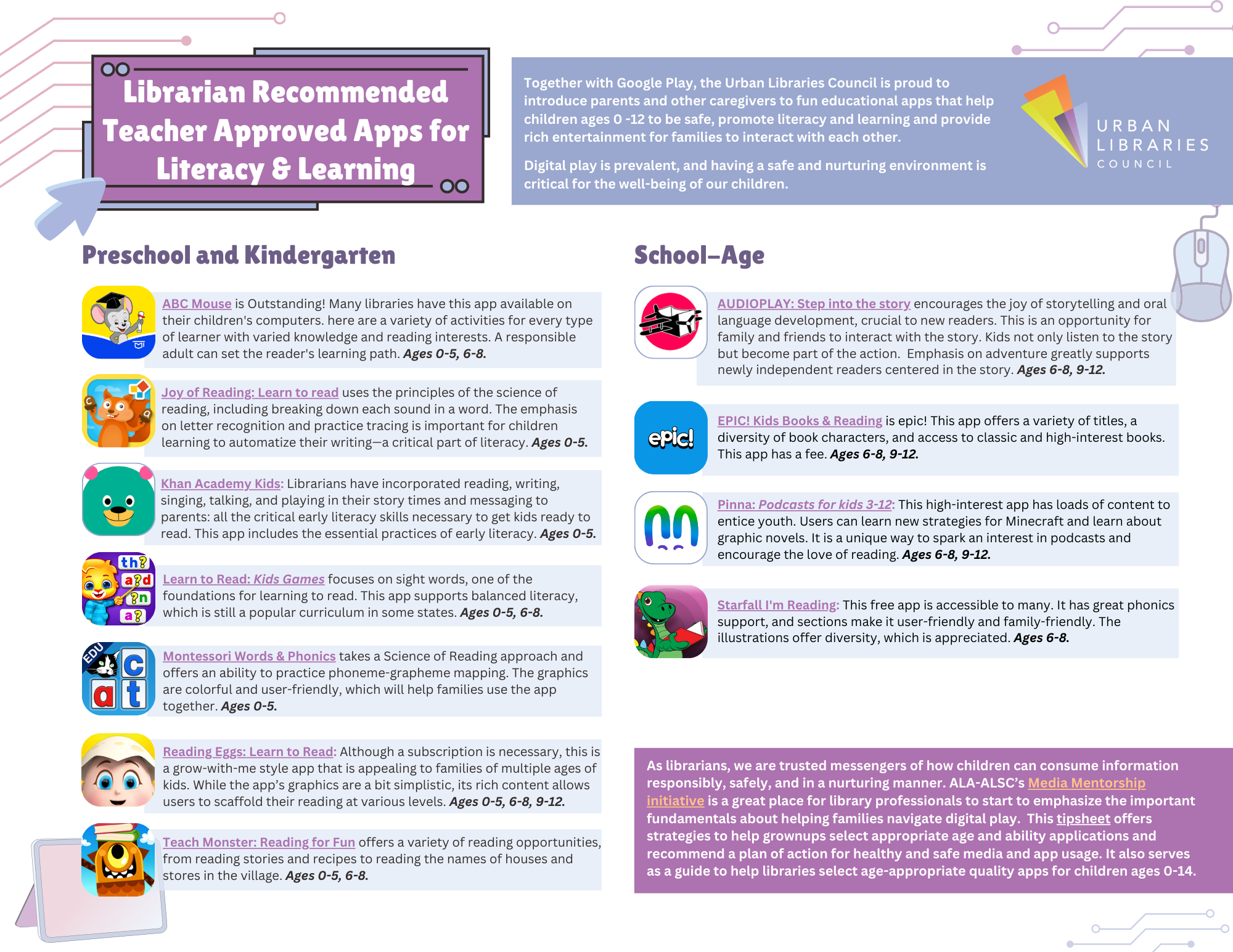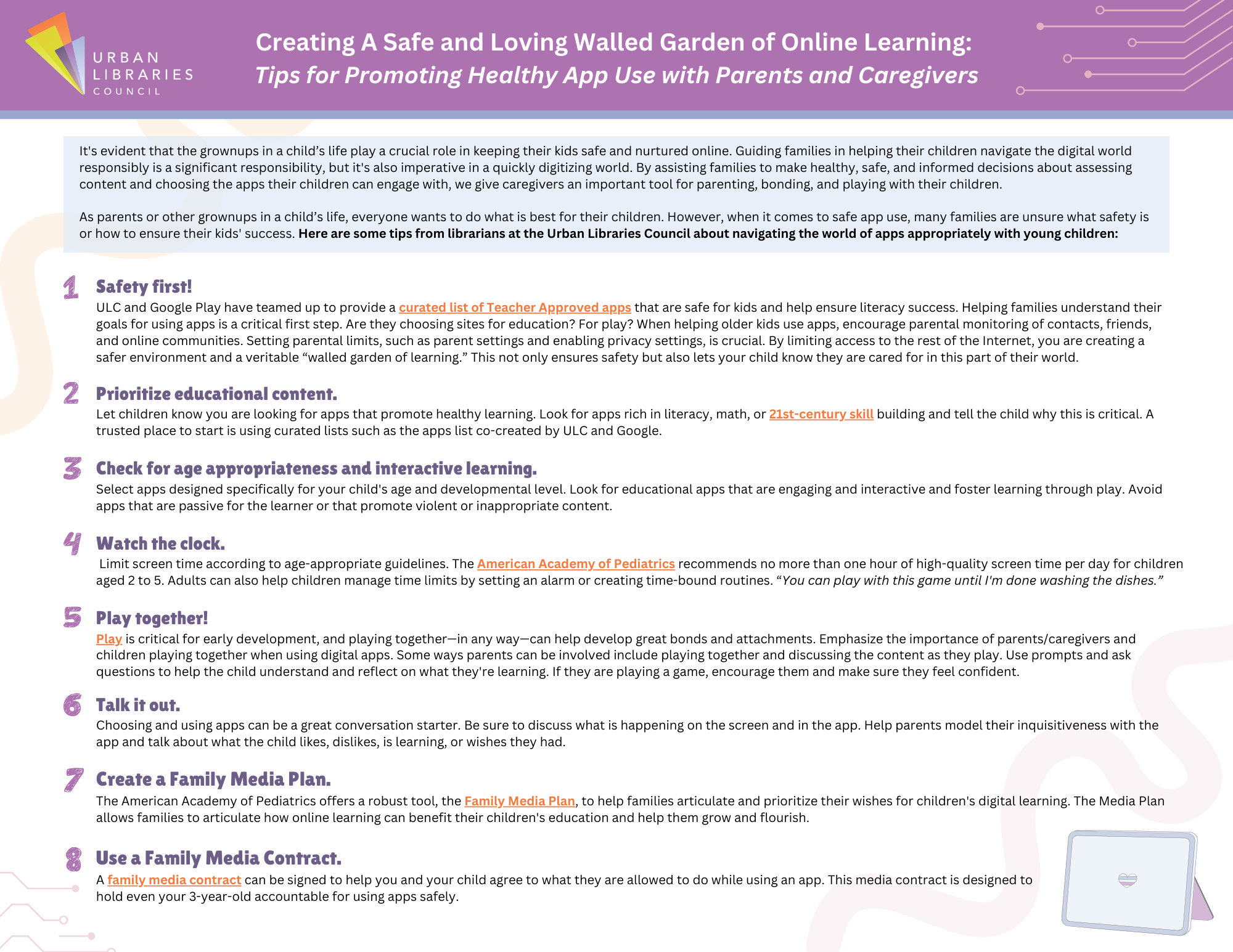Every Child Ready to Click, Ready to Scroll, Using High-Quality Apps to Support Literacy Development
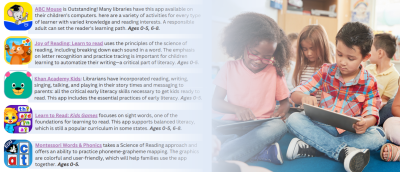
Written by Michelle Hamiel, ULC Chief of Programs, and Liz McChesney, ULC Senior Advisor in Educational Equity
In today’s digital world, children’s apps have become an essential part of early learning, entertainment, and development. While library administrators play a significant role in choosing resources, frontline librarians, educators, and parents are the ones directly interacting with children, guiding them through safe and engaging digital landscapes. This blog aims to provide practical insights for both decision-makers and those who are hands-on with children’s learning journeys—public-facing staff, caregivers seeking trusted tools and educators fostering digital literacy.
The Urban Libraries Council is proud to partner with Google Play to curate a collection of high-quality Teacher Approved apps designed to enrich children’s lives while keeping their safety and learning top of mind.
With a play on Laura Bush's 2021 initiative "Every Child Ready to Read, Ready to Learn,” children today must be ready to read and learn, prepared to click and scroll, and do it with confidence in the safety of their online environment.
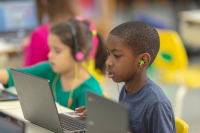
Whether it is a school-issued or personal device, there are expectations of school-aged children to have a media literacy not seen in previous generations. Children must know how to use electronic devices for classwork, homework, coaching classes and more. They are increasingly called upon to understand internet safety and how to navigate educational and beneficial media. Many preschool and kindergarten teachers use SMARTBoards for instruction. The rise in educational technology means children as young as three may have access to screens in their classrooms and are taught how to engage with a SMARTBoard.
In 2001, Laura Bush began the “Every Child Ready to Read” initiative in America's libraries, with the goal of every child entering "their first classroom" ready to read and learn. Entering school ready to read soon became a children's librarian mantra. With robust training and implementation supports, public library staff were at the forefront of preparing preschoolers to enter school well-equipped to be successful learners. Traditionally, librarians have done this work by providing amazing storytimes that include books, engaging storytelling, puppets, songs, dances and play that bolster language skills necessary for kindergarten and hone in on the predictive variables of literacy development.
Librarians continue to be excellent educational partners for out-of-school time programming and closing the learning, reading and phonological gaps children face. Just as reading, math, science and learning skills are critical to being a successful student, so are digital literacy skills—and libraries are responding to these needs. Librarians close digital equity gaps by loaning hotspots and devices and offer content solutions for busy families who need them. We see that as the world becomes more reliant on technology, kindergartners must enter school not only ready to read, but also prepared to use computers to learn. In other words, children must enter school digitally literate: ready to click, ready to scroll.
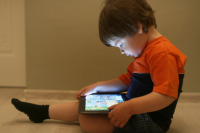
Navigating the world of digital media, apps and social media alike can be intimidating and confusing for anyone—certainly for busy adult caregivers. Couple this resource anxiety with research on how children's use of digital apps has changed over the years, and readers will understand why ULC is partnering with Google to highlight their teacher-approved apps. The use of apps for families with young or school-aged children can be an important ingredient in building their new reader and learner. Apps offer interactive and engaging content that draws children to the sites. Personalized learning allows families to develop resources around their child’s reading needs. Additionally, apps can offer immediate feedback, which is helpful as a child learns to read or practices essential skills like decoding and writing. Appropriate apps will help develop a child’s vocabulary and working knowledge—both essential elements of effective reading.
ULC librarians reviewed 19 Teacher Approved apps in the Google Play store, some of which are available on library computers (free with your library card). Each app was considered based on age appropriateness, content quality, skill development, learning value, ease of play or navigation, app fees and, most importantly, whether library visitors would find it engaging and worthwhile.
Together with Google Play, ULC is proud to introduce parents and caregivers to fun educational apps that provide children ages 12 and under with playful literacy activities and stories and provide rich entertainment for families to interact with each other. Digital play is prevalent, and having a safe and nurturing environment is critical for the well-being of our children.
In 2023, the American Academy of Pediatrics indicated that there is not enough evidence to recommend standardizing the amount of screen time limits for all children (American Academy of Pediatrics, Center of Excellence on Social Media and Youth Mental Health. 2023). The American Academy of Child and Adolescent Psychiatry (May 2024) recommends managing a child's screen time, stating: “Your child is never too young for a screen-time plan.”
Consider the following guidelines:
- Until 18 months of age, screen use should be limited to video chatting along with an adult (i.e., with a parent who is out of town).
- Screen time between 18 and 24 months should be limited to watching educational programming with a caregiver.
- For children ages 2-5, limit non-educational screen time to about 1 hour on weekdays and 3 hours on weekends.
- For ages six and older, encourage healthy habits and limit activities that include screens.
(These guidelines are adapted from [American Academy of Pediatrics, Center of Excellence on Social Media and Youth Mental Health. 2023] and [Screen Media Exposure and Obesity in Children and Adolescents. Pediatrics. 2017 Nov])
Librarian partners will always need to work with families and teachers to improve reading literacy and find just the right book. Finding the right app is the next step in our service to communities. Appropriate use of apps can be a big part of the child's development reading plan and digital literacy skill building. Libraries can help caregivers and parents choose apps to help meet educational and play goals. Today, librarians can not only help families close reading literacy gaps, but we can also help close digital literacy gaps by assuring kids have a safe and nurturing space to explore online content and that they are ready to click and ready to scroll.
See the list of ULC librarian-approved apps and helpful hints for caregivers and parents on safely using media apps. Click below to download.
Librarians play a pivotal role in promoting digital literacy and ensuring equitable access to tools and programs that support the education of young people. As professionals, we are trusted messengers of how children can consume information responsibly, safely, and in a nurturing manner. ALA-ALSC’s Media Mentorship initiative is a great place for library professionals to start to emphasize the important fundamentals about helping families navigate digital play.
ULC has also created a tip sheet that offers strategies to help grownups select appropriate age and ability applications and recommend a plan of action for healthy and safe media and app usage. It also serves as a guide to help libraries select age-appropriate quality apps for children ages 0-14. Click below to download.

